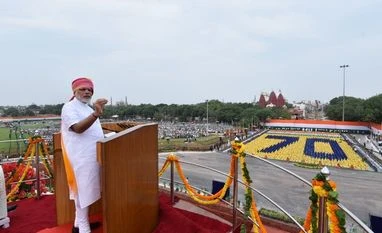Unlike his previous two speeches from the ramparts of the Red Fort on the occasion of the Independence Day, Prime Minister Narendra Modi today didn’t announce any new schemes or policy initiatives that his government plans to take.
Instead, the PM highlighted the change in work culture that his government has brought with its efficiency, sensitivity and accountability. He stressed on implementing of existing schemes to reach farmers and women, but particularly the “delivery” to the poorest.
Interestingly, the passage of the Goods and Services Tax (GST) constitution amendment Bill by Parliament in its winter session was mentioned cursorily – a mere two lines in the over 110-minute long speech. He did speak at some length on how his government has contributed to ‘ease of doing business’ in India.
Modi also indicated that his government didn’t favour disinvestment of public sector undertakings, pointing out how such loss making PSUs as Air India, BSNL and Shipping Corporation of India have been turned around to post operational profits. “Earlier PSUs were put in place either to be locked down or sold. Not anymore,” he said.
Many of Modi’s predecessors have used the Independence Day speech to hit out at Pakistan for sponsoring terrorism into India. The PM, however, didn’t launch into any war of words against the neighbouring country. Instead, Modi said he was overwhelmed by the gratitude that the people of Gilgit, Balochistan and Pakistan occupied Kashmir (PoK) have expressed for him for raising their concerns.
At the all-party meeting on Kashmir on Friday, the PM in his speech had said that Pakistan should be exposed for the atrocities it perpetrates on its people in Gilgit, Balochistan and PoK.
Also Read
The threat, however, was unmistakable – Pakistan’s persistence with its Kashmir policy would force New Delhi, just as it had done in the run up to the liberation of Bangladesh in 1971, tell the world about Islamabad bombing its own people in these regions.
The PM said his government’s foreign policy was made evident when he invited all heads of governments of South Asian Association for Regional Cooperation (SAARC) for the oath taking ceremony of his council of ministers in 2014. “The most important freedom is the freedom from poverty. We in India would be the happiest if people living in our neighbouring country were to get freedom from poverty,” he said, without referring to Pakistan directly even once.
Neither did he refer to the recent turmoil in Kashmir. He said India will never bend to terrorists and appealed to youths that have taken the path of Maoism to join the mainstream.
Modi did appeal at length about the need to maintain harmony and strengthen India’s unity in diversity. In the context of violence against dalits, the PM said all needed to fight the curse of caste system and untouchability. Modi said mere economic prowess cannot make India a strong nation. “A strong India can be built on the foundation of social justice,” he said.
There was also a strong nationalistic undercurrent to the speech, with the PM ending it by announcing a 20% hike in the pension that freedom fighters receive. Starting his speech by remembering Mahatma Gandhi, Sardar Patel and even Jawaharlal Nehru, the PM said the challenge was to transform ‘swaraj’, or self-government, into ‘suraj’, or good governance. Modi said his government has been free of allegations, and it would take a week if he were to start listing its achievements. The governance provided by his government, the PM said, wasn’t just in its niti, or policy, but nirnaya, decision making, and niyat, or intent.
Giving the slogan of ‘reform, perform, transform’, the PM listed the efforts of his government to ease the life of the common man. He said the Railways now issues 15,000 tickets a minute from earlier 2000 tickets, tax terrorism is at an end and 1.75 crore passports issued in 2015-16. Modi said that in last July permission to 900 factories to be set up was given, and that the time taken to give such clearances has reduced from six months to 24 hours. “Now, people are not satisfied by mere announcements but want to see these implemented,” he said.
Modi said construction of rural roads has increased from 70-75 km a day to 100 km, 40% improvement in renewable energy, 120% in solar energy, nearly 50,000 km transmission lines being installed each year from 30,000 to 35,000 km earlier and 3,500 km of railway tracks have been laid in the last two years when only 1,500 km were laid during the UPA’s 10-year rule.
The PM said that in his 2014 speech had called for construction of toilets in rural areas. Today, the PM said, two crore toilets have been constructed and 70,000 villages are now free of open defecation. He also spoke at length about the schemes his government has taken for the welfare of farmers and how Aadhaar card is ending corruption at the lower levels of bureaucracy.
Aware that people still see him as an agent of change, Modi took pains to talk about his own role in ensuring expediting of decision making. The PM said the Pragati group he heads has cleared 118 projects worth Rs 7.5 lakh crore that were stuck for years. Similarly, the Project Monitoring Group is looking at 270 stalled projects worth over 2 lakh crore.
Senior cabinet ministers, former PM Manmohan Singh and his wife, Leader of Opposition in the Rajya Sabha Ghulam Nabi Azad and Delhi Chief Minister Arvind Kejriwal were present, apart from hundreds of diplomats and military attaches of foreign government.



)